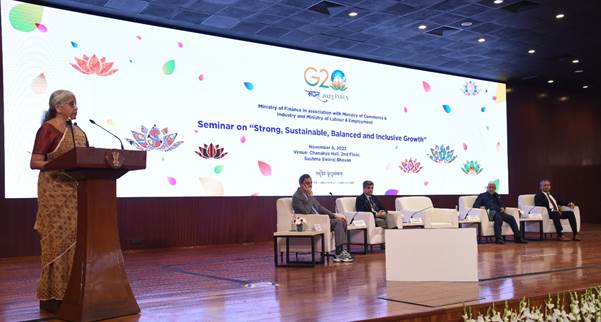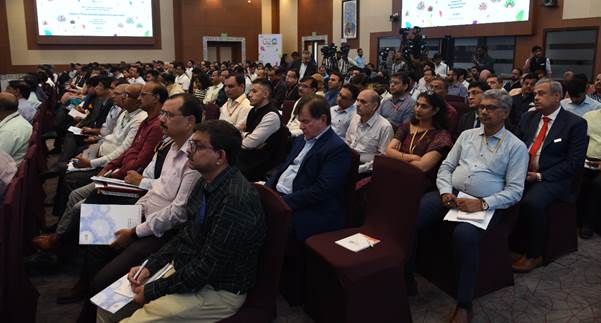Last Updated on November 7, 2023 12:28 am by INDIAN AWAAZ
Says DPI has revolutionised financial inclusion landscape and India is at forefront of this revolution

AMN / WEB DESK
Finance Minister Nirmala Sitharaman has said that Digital Public Infrastructure DPI has revolutionised the financial inclusion landscape and has been lauded globally. Addressing a seminar in New Delhi today, Ms Sitharaman said, India has been at the forefront of this revolution and India’s own growth story has gained significant momentum through DPI. She said, DPIs also play a crucial part in G2P payments, ensuring targeted, transparent payments and promoting the inclusion of vulnerable groups such as women, students, and the elderly.
The Minister said, that with over 50 crore Jan Dhan bank accounts opened and a monthly transaction volume of over 10 billion through UPI, India’s example vividly illustrates how DPIs have enhanced not just access but also the usage and quality of financial inclusion. She said, drawing inspiration from India’s successful implementation of the India Stack, the G20 Policy Recommendations for Advancing Financial Inclusion through DPI was endorsed in the New Delhi Leader’s Declaration.
Ms Sitharaman said, these recommendations provide guidance on developing well-structured DPIs, establishing risk-managed regulatory frameworks, promoting strong governance, and ensuring that DPIs serve everyone. She said, DPI is also embedded within the G20 New Financial Inclusion Action Plan for 2024-26. The Minister said, that with India now the co-chair of the Global Partnership for Financial Inclusion, which is tasked with the implementation of the Action Plan, it will have a key role in building on the foundational work done during the Presidency year.
She said, the New Delhi Leaders’ Declaration recognises that well-integrated and adequately skilled workers benefit origin and destination countries alike. Ms Sitharaman said, it also emphasises the importance of addressing skill gaps globally and provides comprehensive policy guidance in this respect. She said, that G20 policy priorities for addressing skill gaps globally, facilitating cross-country comparability and mutual recognition of skills and qualifications, and comprehensive tool kits for upskilling and reskilling are areas that the Declaration has addressed.
The Minister said, that since the pandemic, the global economy has been grappling with multiple crises, adversely affecting global growth. While the recovery is underway, it remains slow and uneven. She said, the current pace of global growth remains quite weak, well below the 3.8 percent average in the two decades before the pandemic, and looking ahead over the medium term, growth prospects have weakened further. Ms Sitharaman said, policy coordination, both global as well as domestic, is critical to ensure that growth comes back on track and remains strong, sustainable, balanced, and inclusive. She said, to this effect, the New Delhi Leaders’ Declaration underscores the urgency of implementing well-calibrated macroeconomic and structural policies to bolster equitable growth and enhance macroeconomic and financial stability.
The seminar on ‘Strong, Sustainable, Balanced and Inclusive Growth’ was jointly organised by the Department of Economic Affairs, Department of Commerce, and Ministry of Labour and Employment under the aegis of the G20 India Presidency.
G20 leaders recognised the significant role of digital public infrastructure in helping to advance financial inclusion in support of inclusive growth and sustainable development. The Leaders also endorsed the G20 2023 Financial Inclusion Action Plan (FIAP), that will be implemented from 2024-2026.
Dr. V. Anantha Nageswaran, Chief Economic Adviser, Government of India, moderated the discussion and the expert panellists included Shri S. Ramann, Chairman and Managing Director, SIDBI; Shri Rajesh Bansal, Chief Executive Officer of RBI Innovation Hub; and Professor Sachin Chaturvedi, Director General, Research, and Information System for Developing Countries (RIS).
The discussion gathered ideas and fostered discussions on the way forward in leveraging innovative approaches, including DPI, to advance financial inclusion and growth on a global scale. Eminent thinkers, policymakers, and experts conveyed valuable insights and strategies with the potential to shape the future of financial inclusion at the event.

Dr. Nageswaran underscored the significance of the DPI approach to fast pace the global financial inclusion efforts and, therefore, achieve inclusive and sustained growth. The discussion examined possibilities for governments, regulators, and private entities to work together in creating, innovating, and enhancing a secure digital financial services environment. Additionally, it delved into the significant potential of Digital Public Infrastructure (DPI) within the framework of the recently embraced G20 policy recommendations concerning DPI’s role in advancing financial inclusion and productivity gains. The conversation also explored the prospects for leveraging DPI’s potential, both in the public and private sectors, to achieve robust, sustainable, and equitable growth within G20 nations and beyond.
